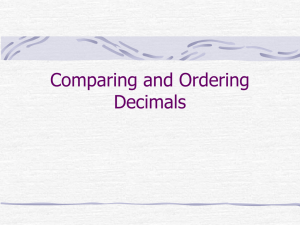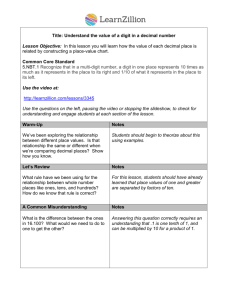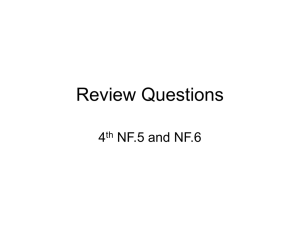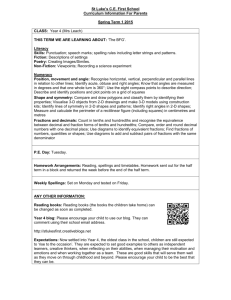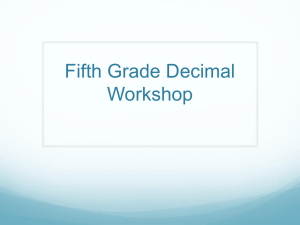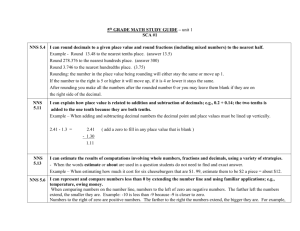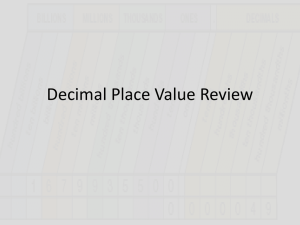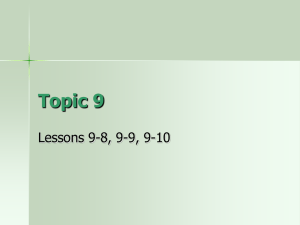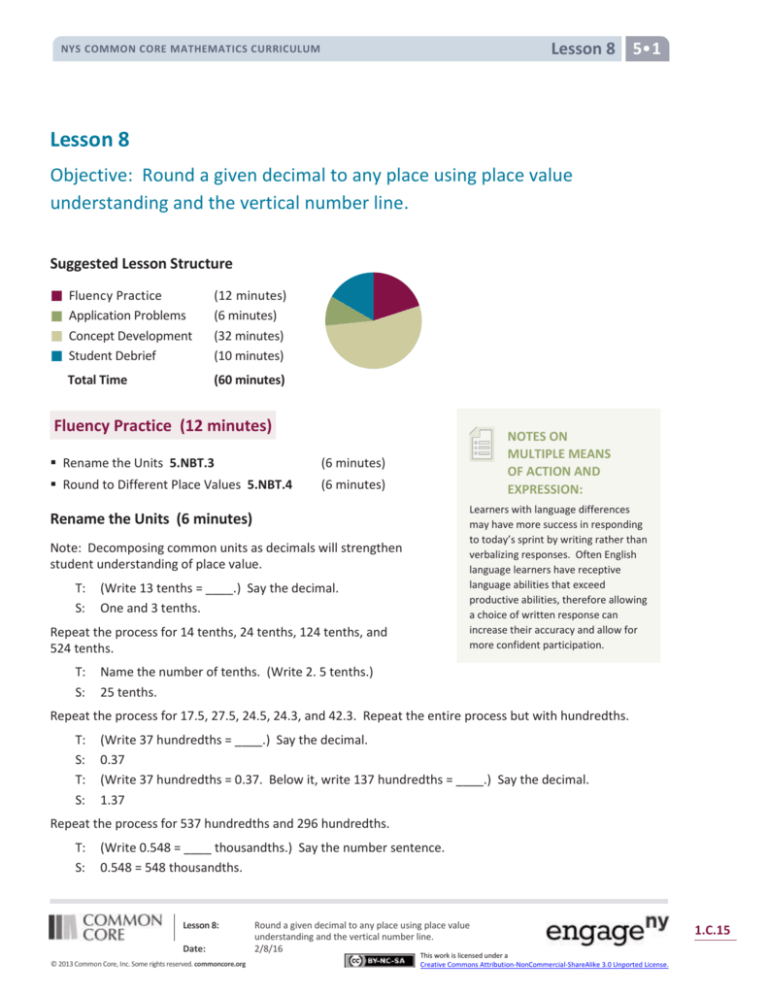
Lesson 8 5•1
NYS COMMON CORE MATHEMATICS CURRICULUM
Lesson 8
Objective: Round a given decimal to any place using place value
understanding and the vertical number line.
Suggested Lesson Structure
Fluency Practice
Application Problems
Concept Development
Student Debrief
Total Time
(12 minutes)
(6 minutes)
(32 minutes)
(10 minutes)
(60 minutes)
Fluency Practice (12 minutes)
Rename the Units 5.NBT.3
(6 minutes)
Round to Different Place Values 5.NBT.4
(6 minutes)
NOTES ON
MULTIPLE MEANS
OF ACTION AND
EXPRESSION:
Learners with language differences
may have more success in responding
to today’s sprint by writing rather than
verbalizing responses. Often English
language learners have receptive
language abilities that exceed
productive abilities, therefore allowing
a choice of written response can
increase their accuracy and allow for
more confident participation.
Rename the Units (6 minutes)
Note: Decomposing common units as decimals will strengthen
student understanding of place value.
T:
S:
(Write 13 tenths = ____.) Say the decimal.
One and 3 tenths.
Repeat the process for 14 tenths, 24 tenths, 124 tenths, and
524 tenths.
T:
S:
Name the number of tenths. (Write 2. 5 tenths.)
25 tenths.
Repeat the process for 17.5, 27.5, 24.5, 24.3, and 42.3. Repeat the entire process but with hundredths.
T:
S:
T:
S:
(Write 37 hundredths = ____.) Say the decimal.
0.37
(Write 37 hundredths = 0.37. Below it, write 137 hundredths = ____.) Say the decimal.
1.37
Repeat the process for 537 hundredths and 296 hundredths.
T:
S:
(Write 0.548 = ____ thousandths.) Say the number sentence.
0.548 = 548 thousandths.
Lesson 8:
Date:
© 2013 Common Core, Inc. Some rights reserved. commoncore.org
Round a given decimal to any place using place value
understanding and the vertical number line.
2/8/16
This work is licensed under a
Creative Commons Attribution-NonCommercial-ShareAlike 3.0 Unported License.
1.C.15
Lesson 8 5•1
NYS COMMON CORE MATHEMATICS CURRICULUM
T:
S:
(Write 0.548 = 548 thousandths. Below it, write 1.548 = ____ thousandths.) Say the number
sentence.
1.548 = 1548 thousandths.
Repeat the process for 2.548 and 7.352.
Round to Different Place Values (6 minutes)
NOTES ON
MULTIPLE MEANS
OF ENGAGEMENT:
Materials: (S) Personal white boards
Note: Reviewing this skill introduced in Lesson 7 will help students
work towards mastery of rounding decimal numbers to different
place values.
Although the approximation sign (≈) is used in Grade 4, a quick
review of its meaning may be in order.
T:
S:
T:
T:
S:
T:
S:
T:
T:
S:
T:
S:
T:
S:
Turn and talk is a strategy intended to
broaden active student participation by
offering opportunity for all to speak
during a lesson. Spend time in the
beginning of the school year helping
students understand what turn and
talk looks like and sounds like by
demonstrating with a student for the
whole class. Modeling knee-to-knee,
eye-to-eye body posture and active
listening expectations (Can I restate my
partner’s ideas in my own words?)
make for successful implementation of
this powerful strategy.
(Project 8.735.) Say the number.
8 and 735 thousandths.
Draw a vertical number line on your boards with 2
endpoints and a midpoint.
Between what two ones is 8.735?
8 ones and 9 ones.
What’s the midpoint for 8 and 9?
8.5
Fill in your endpoints and midpoint.
8.5 is the same as how many tenths?
85 tenths.
How many tenths are in 8.735?
87 tenths.
(Write 8.735 ≈ _______.) Show 8.735 on your number line and write the number sentence.
(Students write 8.735 between 8.5 and 9 on the number line and write 8.735 ≈ 9.)
Repeat the process for the tenths place and hundredths place. Follow the same process and procedure for
7.458.
Application Problem (6 minutes)
Organic, whole-wheat flour sells in bags weighing 2.915 kilograms. How much flour is this rounded to the
nearest tenth? How much flour is this rounded to the nearest one? What is the difference of the two
answers? Use a place value chart and number line to explain your thinking.
Lesson 8:
Date:
© 2013 Common Core, Inc. Some rights reserved. commoncore.org
Round a given decimal to any place using place value
understanding and the vertical number line.
2/8/16
This work is licensed under a
Creative Commons Attribution-NonCommercial-ShareAlike 3.0 Unported License.
1.C.16
Lesson 8 5•1
NYS COMMON CORE MATHEMATICS CURRICULUM
Concept Development (32 minutes)
Materials: (S) Personal place value boards
Problem 1
Round 49.67 to the nearest ten.
T:
T:
S:
Turn and talk to your partner about the different ways 49.67
could be decomposed using place value disks. Show the
decomposition that you think will be most helpful in
rounding to the nearest ten.
Which one of these decompositions did you decide was the
most helpful?
The decomposition with more tens is most helpful, because
it helps me identify the two rounding choices: 4 tens or 5
tens.
4 tens
T:
9 ones
6 tenths
7 hundredths
49 ones
6 tenths
7 hundredths
496 tenths
7 hundredths
5 tens or 50
45.67
4 tens or 40
Draw and label a number line and circle the rounded
value. Explain your reasoning.
Repeat this sequence with rounding 49.67 to the nearest ones, and then tenths.
Problem 2
Decompose 9.949 and round to the nearest tenth and hundredth.
Show your work on a number line.
100 tenths = 10
9.949
9 ones
T:
S:
9 tenths
4 hundredths
9 thousandths
99 tenths
4 hundredths
9 thousandths
994 hundredths
9 thousandths
99 tenths = 9.9
What decomposition of 9.949 best helps to round this
number to the nearest tenth?
The one using the most tenths to name the decimal fraction. I knew I would round to either 99
tenths or 100 tenths. I looked at the hundredths. Nine hundredths is past the midpoint, so I
rounded to the next tenth, 100 tenths. One hundred tenths is the same as 10.
Lesson 8:
Date:
© 2013 Common Core, Inc. Some rights reserved. commoncore.org
Round a given decimal to any place using place value
understanding and the vertical number line.
2/8/16
This work is licensed under a
Creative Commons Attribution-NonCommercial-ShareAlike 3.0 Unported License.
1.C.17
Lesson 8 5•1
NYS COMMON CORE MATHEMATICS CURRICULUM
T:
S:
Which digit made no difference when you rounded to the nearest tenth? Explain your thinking.
The thousandths, because the hundredths decided which direction to round. As long as I had 5
hundredths, I was past the halfway point so I rounded to the next number.
Repeat the process rounding to the nearest hundredth.
Problem 3
A decimal number has 1 digit to the right of the decimal point. If we round this number to the nearest whole
number, the result is 27. What are the maximum and minimum possible values of these two numbers? Use a
number line to show your reasoning. Include the midpoint on the number line.
T:
T:
S:
T:
S:
T:
S:
T:
T:
S:
(Draw a vertical number line with 3 points.)
What do we know about the unknown number?
It has a number in the tenths place, but nothing else past the decimal point. We know that is has
been rounded to 27.
(Write 27 at the bottom point on the number line and circle it.) Why did I place 27 as the lesser
rounded value?
We are looking for the largest number that will round down to 27. That number will be greater than
27, but less than the midpoint between 27 and 28.
What is the midpoint between 27 and 28?
27.5
(Place 27.5 on the number line.)
If we look at numbers that have exactly 1 digit to the right of the decimal point, what is the greatest
one that will round down to 27?
27.4. If we go to 27.5, that would round up to 28.
Repeat the same process to find the minimum value.
To find maximum
To find minimum
28
27
27.4
26.5
27
26
27
Lesson 8:
Date:
© 2013 Common Core, Inc. Some rights reserved. commoncore.org
Round a given decimal to any place using place value
understanding and the vertical number line.
2/8/16
This work is licensed under a
Creative Commons Attribution-NonCommercial-ShareAlike 3.0 Unported License.
1.C.18
Lesson 8 5•1
NYS COMMON CORE MATHEMATICS CURRICULUM
Encourage further discussion with the following:
What if our number had exactly 2 digits to the right of the decimal point? Could I find a number larger than
27.4 that would still round down to 27? (Various answers could be expected: 27.41, 27.49, etc.). What is the
largest possible value it could have? (27.49.)
A similar discussion can take place in finding the minimum when students discover that 26.5 rounds up to 27.
Lead students to discover that something different happens here. Can we find a number less than 26.5 with
exactly 2 digits to the right of the decimal point that would still round up? (No, nothing smaller than 26.50.)
Problem Set (10 minutes)
Students should do their personal best to complete the problem set within the allotted 10 minutes. For some
classes, it may be appropriate to modify the assignment by specifying which problems they work on first.
Some problems do not specify a method for solving. Students solve these problems using the RDW approach
used for Application Problems.
On this Problem Set, we suggest all students begin with Problems 1 and 3 and possibly leave Problem 2 to the
end if they still have time.
Before circulating while students work, review the debrief questions relevant to the problem set so that you
can better guide students to a deeper understanding of a skill with the lesson’s objective.
Student Debrief (10 minutes)
Lesson Objective: Round a given decimal to any place
using place value understanding and the vertical
number line.
The Student Debrief is intended to invite reflection and
active processing of the total lesson experience.
Invite students to review their solutions for the Problem
Set. They should check work by comparing answers
with a partner before going over answers as a class.
Look for misconceptions or misunderstandings that can
be addressed in the Debrief. Guide students in a
conversation to debrief the Problem Set and process
the lesson. You may choose to use any combination of
the questions below to lead the discussion.
Compare our approach to rounding today and
yesterday. How are they alike? How are they
different? (Students will likely offer many
accurate responses. However, lead the
discussion toward the notion of our only
choosing specific decompositions to round in
today’s lesson as opposed to naming every
Lesson 8:
Date:
© 2013 Common Core, Inc. Some rights reserved. commoncore.org
Round a given decimal to any place using place value
understanding and the vertical number line.
2/8/16
This work is licensed under a
Creative Commons Attribution-NonCommercial-ShareAlike 3.0 Unported License.
1.C.19
Lesson 8 5•1
NYS COMMON CORE MATHEMATICS CURRICULUM
decomposition in yesterday’s lesson. Also
explore which units (place values) are worthy of
attention and which are not when rounding to
a specific place value. Are there patterns to
these choices?)
Once a number rounds up at one place value,
does it follow then that every place value will
round up? Why or why not? (Encourage
students to reference their problem sets as
evidence of their reasoning. Problem 1(b)
provides an example of differing unit choices
resulting in differences in rounding up and down.)
How does the place value chart help organize
your thinking when rounding?
Finding the maximum and minimum values poses
a significant increase in cognitive load and an
opportunity to build excitement! Make time to
deeply discuss ways of reasoning about these
tasks, as they are sure to be many and varied.
Consider a discussion of Problem 3 that mirrors
the one in the lesson: What if our number had
exactly three digits to the right of the decimal?
Can we find a value larger than 13.74 that would round down to 13.7? (13.749) What about 4
places or 5 places to the right of the decimal? (13.7499, 13.74999) Encourage students to generalize
that we can get infinitely close to 13.5 with a decimal that has an infinite number of 9’s yet that
decimal will still round down to 13.7. We can find points on the number line as close as we like, and
yet they will not be equal to 13.75. Follow that with the discovery that this is not true for our
minimum value. There is nothing smaller than 13.750 that will round up to 13.8. Math journals offer
a venue for students to continue to explore maximum and minimum tasks beyond today’s lesson.
Exit Ticket (3 minutes)
After the Student Debrief, instruct students to complete the Exit Ticket. A review of their work will help you
assess the students’ understanding of the concepts that were presented in the lesson today and plan more
effectively for future lessons. You may read the questions aloud to the students.
Lesson 8:
Date:
© 2013 Common Core, Inc. Some rights reserved. commoncore.org
Round a given decimal to any place using place value
understanding and the vertical number line.
2/8/16
This work is licensed under a
Creative Commons Attribution-NonCommercial-ShareAlike 3.0 Unported License.
1.C.20
Lesson 8 Problem Set 5•1
NYS COMMON CORE MATHEMATICS CURRICULUM
Name
Date
1. Write the decomposition that helps you, and then round to the given place value. Draw number lines to
explain your thinking. Circle the rounded value on each number line.
a. Round 32.697 to nearest tenth, hundredth, and whole number.
b. Round 141.999 to nearest tenth, hundredth, ten, and hundred.
2. A root beer factory produces 132,554 cases in 100 days. About how many cases does the factory produce
in 1 day? Round your answer to the nearest tenth of a case. Show your thinking on the number line.
Lesson 8:
Date:
© 2013 Common Core, Inc. Some rights reserved. commoncore.org
Round a given decimal to any place using place value
understanding and the vertical number line.
2/8/16
This work is licensed under a
Creative Commons Attribution-NonCommercial-ShareAlike 3.0 Unported License.
1.C.21
NYS COMMON CORE MATHEMATICS CURRICULUM
Lesson 8 Problem Set 5•1
3. A decimal number has two digits to the right of its decimal point. If we round it to the nearest tenth, the
result is 13.7.
a. What is the maximum possible value of this number? Use words and the number line to explain your
reasoning. Include the midpoint on your number line.
13.8
13.7
b. What is the minimum possible value of this decimal? Use words and the number line to explain your
reasoning. Include the midpoint on your number line.
Lesson 8:
Date:
© 2013 Common Core, Inc. Some rights reserved. commoncore.org
Round a given decimal to any place using place value
understanding and the vertical number line.
2/8/16
This work is licensed under a
Creative Commons Attribution-NonCommercial-ShareAlike 3.0 Unported License.
1.C.22
NYS COMMON CORE MATHEMATICS CURRICULUM
Name
Lesson 8 Exit Ticket 5•1
Date
1. Round the quantity to the given place value. Draw number lines to explain your thinking. Circle the
rounded value on the number line.
a. 13.989 to nearest tenth
Lesson 8:
Date:
© 2013 Common Core, Inc. Some rights reserved. commoncore.org
b. 382.993 to nearest hundredth
Round a given decimal to any place using place value
understanding and the vertical number line.
2/8/16
This work is licensed under a
Creative Commons Attribution-NonCommercial-ShareAlike 3.0 Unported License.
1.C.23
NYS COMMON CORE MATHEMATICS CURRICULUM
Name
Lesson 8 Homework 5•1
Date
1. Round the quantity to the given place value. Draw number lines to explain your thinking. Circle the
rounded value on the number line.
a. 43.586 to nearest tenth, hundredth, and whole number
b. 243.875 to nearest tenth, hundredth, ten, and hundred
2. A trip from New York City to Seattle is 2,852.1 miles. A family wants to make the drive in 10 days, driving
the same number of miles each day. About how many miles will they drive each day? Round you answer
to the nearest tenth of a mile.
Lesson 8:
Date:
© 2013 Common Core, Inc. Some rights reserved. commoncore.org
Round a given decimal to any place using place value
understanding and the vertical number line.
2/8/16
This work is licensed under a
Creative Commons Attribution-NonCommercial-ShareAlike 3.0 Unported License.
1.C.24
NYS COMMON CORE MATHEMATICS CURRICULUM
Lesson 8 Homework 5•1
3. A decimal number has two digits to the right of its decimal point. If we round it to the nearest tenth, the
result is 18.6.
a. What is the maximum possible value of this decimal? Use words and the number line to explain your
reasoning.
18.7 (1870 hundredths)
18.6
b. What is the minimum possible value of this decimal? Use words, numbers and pictures to explain
your reasoning.
18.6
18.5
Lesson 8:
Date:
© 2013 Common Core, Inc. Some rights reserved. commoncore.org
Round a given decimal to any place using place value
understanding and the vertical number line.
2/8/16
This work is licensed under a
Creative Commons Attribution-NonCommercial-ShareAlike 3.0 Unported License.
1.C.25

